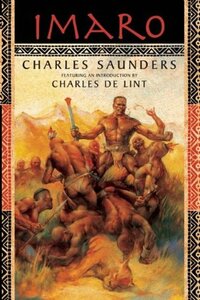Take a photo of a barcode or cover
adventurous
sad
tense
fast-paced
Plot or Character Driven:
Character
Strong character development:
Yes
Loveable characters:
Yes
Diverse cast of characters:
Yes
Flaws of characters a main focus:
Yes
Imaro was nothing short of awe-inducing. Mirron Willis as narrator gives this tale a gravitas that helps elevate it to the realm of myth. Coupled with Charles Saunders' rich descriptions, listening to this book left me feeling as though I'd indulged in the written equivalent of decadent cake. It was like hearing a recounting of an ancient legend - the landscape is sweeping and the hero appropriately epic.
I have loved science fiction and fantasy since I was a child. As I grew, I began to lean more heavily towards sci-fi, not only because I am deeply passionate about science and technology, but also because the genre ultimately felt more diverse, which is something intimately important to me. I still enjoy the concept of magic as an adult now, and have been actively seeking out fantasy works that break from the tried-and-true Old World European-inspired settings. Imaro does not disappoint as a high fantasy work set in an African-influenced world.
I quickly became emotionally invested in this story. The protagonist, after whom the book is titled, has a life full of pain as an outsider no matter where he goes, but he has such an unfailing determination, one can't help but hope that *this time* something good will happen, or *this time* he's found his place. There are forces at work, however, that seem hell-bent on preventing Imaro from finding peace, and my heart ached for him many times. The book ends on a cliffhanger to which I eagerly await the resolution. I highly recommend this to anyone who enjoys grand fantasy and is looking for something different from the genre's usual settings.
I have loved science fiction and fantasy since I was a child. As I grew, I began to lean more heavily towards sci-fi, not only because I am deeply passionate about science and technology, but also because the genre ultimately felt more diverse, which is something intimately important to me. I still enjoy the concept of magic as an adult now, and have been actively seeking out fantasy works that break from the tried-and-true Old World European-inspired settings. Imaro does not disappoint as a high fantasy work set in an African-influenced world.
I quickly became emotionally invested in this story. The protagonist, after whom the book is titled, has a life full of pain as an outsider no matter where he goes, but he has such an unfailing determination, one can't help but hope that *this time* something good will happen, or *this time* he's found his place. There are forces at work, however, that seem hell-bent on preventing Imaro from finding peace, and my heart ached for him many times. The book ends on a cliffhanger to which I eagerly await the resolution. I highly recommend this to anyone who enjoys grand fantasy and is looking for something different from the genre's usual settings.
adventurous
inspiring
lighthearted
fast-paced
Plot or Character Driven:
Plot
Strong character development:
Complicated
Loveable characters:
No
Diverse cast of characters:
Yes
Flaws of characters a main focus:
Complicated
I really liked this a lot... perhaps more than Conan, which I’m sure you are comparing it too. It’s vignettes but connected.
In the hands of its most talented practitioners, Sword & Sorcery can be thrilling, scintillating, and deeply ironic--which makes it all the more regrettable to see just how thoughtless and cliche depictions of race and sex tend to be in the genre. Part of what excited me about the prospect of reading this hard-to-find series was that it is very much about race, a self-aware deconstruction of one of the genre’s historic failings.
It is that--as well as a dip into African History, a fascinating (and vast) slice of the human story that is too often ignored and downplayed--especially in the face of the endless pseudo-Medieval setting that covers the fantasy genre like a fetid swamp. However, the parallels with modern, Colonial slavery and the complexities of identity of American Blacks born to that tradition are a bit too on-the-nose. I would have appreciated more of a Humanistic look at the role slavery has played in human history, as well as the way that racial identity is coded and manufactured socially--it’s a vast and important set of ideas that needs more than simply the xenophobia of Lovecraft versus the modern, post-Civil Rights view to encapsulate it.
It was pleasant--particularly after trying the Kane series--to read stories which are so intensely focused upon the hero's internal life: his decisions, thoughts, experiences, and emotions. Never was there that struggle to connect the character to the world and to the story--as so often crops up in tales of ‘impossibly muscled’ heroes who cleave their way from danger to danger by the sweat of their brow, but otherwise remain aloof.
Unfortunately, Imaro’s successes were too often the result of a sort of generic ‘strength’--an overcoming by gritting one’s teeth, and simply coming out the other side unscathed. It’s always a shame to see a writer give in to such a simplistic resolution--but it's very common, and not only in the fantasy genre. There are few things more escapist, more wish-fulfilling than the notion of achieving something simply by wanting it enough, willing your way through, and forcing your preferences on the world. If only the world would bend to us, recognize that we are right, and let us have our way--but such a fantasy makes for a poorer story.
I wished that these internal struggles felt as personal and emotional to the character as his motivations. Intense conflict is such a great place to reveal a character, to show how he differs from everyone else on the page--what unique approach he takes, in light of his experiences and personal style.
Of course, that requires the imagination and skill of a seasoned author, while this is only Saunders' preliminary outing. There's certainly a lot of room for improvement, but also a lot of strong elements that make the story engaging and readable. I'll have to give Imaro another try, down the road, and see how he progresses.
It is that--as well as a dip into African History, a fascinating (and vast) slice of the human story that is too often ignored and downplayed--especially in the face of the endless pseudo-Medieval setting that covers the fantasy genre like a fetid swamp. However, the parallels with modern, Colonial slavery and the complexities of identity of American Blacks born to that tradition are a bit too on-the-nose. I would have appreciated more of a Humanistic look at the role slavery has played in human history, as well as the way that racial identity is coded and manufactured socially--it’s a vast and important set of ideas that needs more than simply the xenophobia of Lovecraft versus the modern, post-Civil Rights view to encapsulate it.
It was pleasant--particularly after trying the Kane series--to read stories which are so intensely focused upon the hero's internal life: his decisions, thoughts, experiences, and emotions. Never was there that struggle to connect the character to the world and to the story--as so often crops up in tales of ‘impossibly muscled’ heroes who cleave their way from danger to danger by the sweat of their brow, but otherwise remain aloof.
Unfortunately, Imaro’s successes were too often the result of a sort of generic ‘strength’--an overcoming by gritting one’s teeth, and simply coming out the other side unscathed. It’s always a shame to see a writer give in to such a simplistic resolution--but it's very common, and not only in the fantasy genre. There are few things more escapist, more wish-fulfilling than the notion of achieving something simply by wanting it enough, willing your way through, and forcing your preferences on the world. If only the world would bend to us, recognize that we are right, and let us have our way--but such a fantasy makes for a poorer story.
I wished that these internal struggles felt as personal and emotional to the character as his motivations. Intense conflict is such a great place to reveal a character, to show how he differs from everyone else on the page--what unique approach he takes, in light of his experiences and personal style.
Of course, that requires the imagination and skill of a seasoned author, while this is only Saunders' preliminary outing. There's certainly a lot of room for improvement, but also a lot of strong elements that make the story engaging and readable. I'll have to give Imaro another try, down the road, and see how he progresses.
adventurous
fast-paced
Plot or Character Driven:
A mix
Strong character development:
Complicated
Loveable characters:
Complicated
Diverse cast of characters:
Yes
Flaws of characters a main focus:
Complicated
It was great to read a fantasy book set in a land resembling Africa. I had only read one fantasy book in a similar setting before and it’s a great alternative to the mostly whitewashed popular fantasy. Saunders is a bit too concise in his language for me—the world felt a little bit lacking in detail and the confrontations that were built up to be epic kind of fell flat. I wanted more. But Imaro is a solid book and very worth reading as a fantasy fan.
I really enjoyed the world, which didn't need a whole lot of worldbuilding to be really evocative. I also really liked the magic, which was light and didn't need a whole giant magic system to make sense.
It was a bit repetitive though, which I think made sense because from what I understand it was originally short stories. Read in installments it probably would not have felt so repetitive. Fitting in with the overall simplicity of the genre, the characters also did not have much depth, which would have bothered me more in something other than sword and sorcery. But I did wish the female characters had a bit more depth than just "loving Imaro more than anything."
It was a bit repetitive though, which I think made sense because from what I understand it was originally short stories. Read in installments it probably would not have felt so repetitive. Fitting in with the overall simplicity of the genre, the characters also did not have much depth, which would have bothered me more in something other than sword and sorcery. But I did wish the female characters had a bit more depth than just "loving Imaro more than anything."
This is the story of Imaro, it starts with Imaro being left with his mother's peoplelyassai, the I on the condition that she leaves the tribe and never comes back. He struggles with being accepted by a group of people who have no interest in accepting him. Despite that he is a stronger and more capable warrior than anyone else in the Ilyassai tribe, they reject him. This is in part their own dislike for Imaro, since his is not a full Ilyassai, he is known a son of no father because his father is unknown. The other reason for their dislike is due to their sorcerer, who is aligned with the Mashataan, demon gods, manipulating their minds.
His stories is a continual push and pull of Imaro trying to strike out on his own, his subliminal search for a group of people he can belong to and be fully accepted by and his attempt to find the Mashataan and the Sorcerers of Naama. The Sorcerers and the Mashataan appear to be after him, though the reason is never fully disclosed in this installment. This story is saturated with African traditions and legends and takes place in a place that mirrors a pre-colonial Africa.
I enjoyed this story, a lot more than I anticipated. This is a classic hero tale, with the exception that the main is character is not white. There are a lot of bloody battles, love and the struggle for Imaro to be true to himself and to find his people. By placing Imaro's story in Africa and adding its legends and traditions, Saunders has added a rich and vital element to the fantasy genre.
Imaro's journey is not complete, it has just started. There are four books in the series but only the first two books have been reprinted. That is why I am not sure if I will continue with the series. I enjoyed this book, and want to know what happens next. But if book 2 ends like the first one, I will be left wanting to know the ending of a story that essentially will not end. Either way, I will be reading more Charles Saunders.
His stories is a continual push and pull of Imaro trying to strike out on his own, his subliminal search for a group of people he can belong to and be fully accepted by and his attempt to find the Mashataan and the Sorcerers of Naama. The Sorcerers and the Mashataan appear to be after him, though the reason is never fully disclosed in this installment. This story is saturated with African traditions and legends and takes place in a place that mirrors a pre-colonial Africa.
I enjoyed this story, a lot more than I anticipated. This is a classic hero tale, with the exception that the main is character is not white. There are a lot of bloody battles, love and the struggle for Imaro to be true to himself and to find his people. By placing Imaro's story in Africa and adding its legends and traditions, Saunders has added a rich and vital element to the fantasy genre.
Imaro's journey is not complete, it has just started. There are four books in the series but only the first two books have been reprinted. That is why I am not sure if I will continue with the series. I enjoyed this book, and want to know what happens next. But if book 2 ends like the first one, I will be left wanting to know the ending of a story that essentially will not end. Either way, I will be reading more Charles Saunders.






